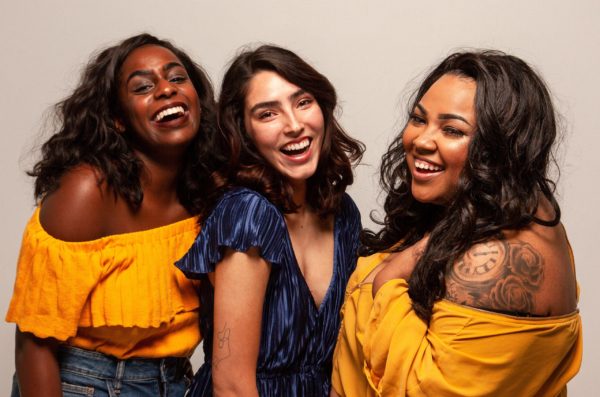
It’s International Women’s Day today. And boy (and girl), do we need to think about the role of women in our world. A recent study by the United Nations, The World’s Women 2015, exposed some alarming statistics. The study revealed how women are faring in eight key areas such as health, work, poverty, and education. While the entire report sheds light on how far women still have to go to achieve equality, I found this statistic most startling:
Nearly 90% of all people—that is, both men and women—are prejudiced against women.
Prejudiced Against Women?
Yes, that’s right. Men and WOMEN are prejudiced against women. This is not just something we can point to the guys and ask them to do better. We, the mothers fostering the next generation of men and women, need to find a way to help our daughters have equal opportunities.
One way to do so is with the resources available on the International Women’s Day website. The theme this year, #EachforEqual, really resonated with me:
“An equal world is an enabled world. Individually, we’re all responsible for our own thoughts and actions–all day, every day. We can actively choose to challenge stereotypes, fight bias, broaden perceptions, improve situations, and celebrate women’s achievements. Collectively, each one of us can help create a gender-equal world. Women’s equality can’t wait. It’s going to take everyone to think and be inclusive–all the time, everywhere. Let’s all be #EachforEqual.”
Resources for Change
The International Women’s Day website provides resources we can access for more information and bring about more action. Their website provides everything you need including selfie cards, social media assets, events, and ideas for change. I especially love the “Lean In Circle” idea where women connect and support one another through peer mentorship.
The “F” Word
Often when I raise women’s inequality, I am rebuffed with responses like, “I’m not a feminist,” or “You’re just being a women’s libber.” We all need to understand that feminism is not a left or right issue. It’s an equality issue that helps women become everything they want to be.
We all need to educate ourselves and our families that women deserve the same access to opportunities, safety, and decisions. We can start by ensuring that we believe in each other and support each woman’s unique dreams and aspirations.
Nine Things Women Couldn’t Do in 1971
Last year on International Women’s Day, I saved a list of Nine Things Women Couldn’t Do in 1971 that gave me pause. I found it again this year and checked its accuracy on Snopes.com. Each one proved to be true.
1. Get a credit card in her own name.
It wasn’t until 1974 that a law forced credit card companies to issue cards to women without their husband’s signature.
2. Be guaranteed that they wouldn’t be unceremoniously fired for getting pregnant.
That changed with the Pregnancy Discrimination Act of 1978.
3. Serve on a jury.
It varied by state, but the main reason women were kept out of jury pools was that they were considered the center of the home. Their primary responsibility was as the caregiver. Women were thought to be too fragile to hear the grisly details of crimes and too sympathetic to remain objective about those accused of offenses. Women couldn’t serve on juries in all 50 states until 1973.
4. Fight on the front lines.
Women weren’t admitted into military academies until 1976. It wasn’t until 2013 that the military ban on women in combat was lifted. Prior to 1973 women were only allowed in the military as nurses or support staff.
5. Get an Ivy League education.
Yale and Princeton didn’t accept female students until 1969. Harvard didn’t admit women until 1977 (when it merged with the all-female Radcliffe College). Brown (which merged with women’s college Pembroke), Dartmouth, and Columbia did not offer admission to women until 1971, 1972 and 1981, respectively.
6. Take legal action against workplace sexual harassment.
Indeed the first time a court recognized office sexual harassment as grounds for any legal action was in 1977.
7. Decide not to have sex if their husband wanted to.
Spousal rape wasn’t criminalized in all 50 states until 1993.
8. Obtain health insurance at the same monetary rate as a man.
Sex discrimination wasn’t outlawed in health insurance until 2010. Today many–including sitting elected officials at the Federal level–feel women don’t mind paying a little more.
9. The birth control pill.
Reproductive freedom was just beginning to be openly discussed in the 1960s. In 1957, the FDA approved the birth control pill only for “severe menstrual distress.” In 1960, the pill was approved for use as a contraceptive. However, the pill was still illegal in some states and could be prescribed only to married women for purposes of family planning. Even then, not all pharmacies stocked it.
Share and Remember
I plan to share this list with my 22-year-old daughter. She needs to know how recently the rights she enjoys today would not have been available to her. Remind yourself–and other women–that we couldn’t do these things just a few decades ago.
We have an obligation to help the next generation understand we still have a long way to go. Will you join me in making our world a more equal place for all women? #EachforEqual












